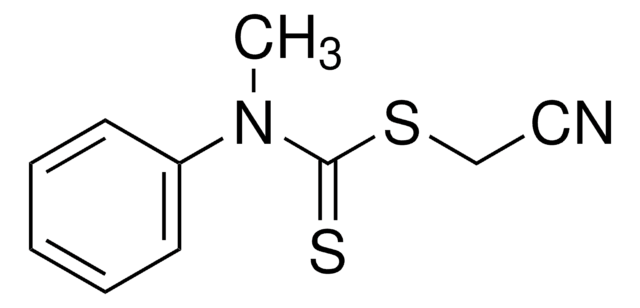V1503
Vinyl acetate
contains 3-20 ppm hydroquinone as inhibitor, ≥99%
Synonym(s):
VAc, Acetoxyethylene
About This Item
Recommended Products
vapor density
3 (vs air)
vapor pressure
88 mmHg ( 20 °C)
Assay
≥99%
autoignition temp.
801 °F
contains
3-20 ppm hydroquinone as inhibitor
expl. lim.
13.4 %
refractive index
n20/D 1.395 (lit.)
bp
72-73 °C (lit.)
mp
−93 °C (lit.)
density
0.934 g/mL at 25 °C (lit.)
storage temp.
2-8°C
SMILES string
CC(=O)OC=C
InChI
1S/C4H6O2/c1-3-6-4(2)5/h3H,1H2,2H3
InChI key
XTXRWKRVRITETP-UHFFFAOYSA-N
Looking for similar products? Visit Product Comparison Guide
Application
Signal Word
Danger
Hazard Statements
Precautionary Statements
Hazard Classifications
Acute Tox. 4 Inhalation - Aquatic Chronic 3 - Carc. 2 - Flam. Liq. 2 - STOT SE 3
Target Organs
Respiratory system
Storage Class Code
3 - Flammable liquids
WGK
WGK 2
Flash Point(F)
17.6 °F - closed cup
Flash Point(C)
-8 °C - closed cup
Personal Protective Equipment
Certificates of Analysis (COA)
Search for Certificates of Analysis (COA) by entering the products Lot/Batch Number. Lot and Batch Numbers can be found on a product’s label following the words ‘Lot’ or ‘Batch’.
Already Own This Product?
Find documentation for the products that you have recently purchased in the Document Library.
Customers Also Viewed
Articles
RAFT polymerization offers living characteristics to radical polymerization, contributing versatility to reversible deactivation radical polymerization methods.
RAFT polymerization offers living characteristics to radical polymerization, contributing versatility to reversible deactivation radical polymerization methods.
RAFT polymerization offers living characteristics to radical polymerization, contributing versatility to reversible deactivation radical polymerization methods.
RAFT polymerization offers living characteristics to radical polymerization, contributing versatility to reversible deactivation radical polymerization methods.
Protocols
RAFT polymerization offers precise control, enabling tailored synthesis of complex polymer structures.
RAFT polymerization offers precise control, enabling tailored synthesis of complex polymer structures.
RAFT polymerization offers precise control, enabling tailored synthesis of complex polymer structures.
RAFT polymerization offers precise control, enabling tailored synthesis of complex polymer structures.
Our team of scientists has experience in all areas of research including Life Science, Material Science, Chemical Synthesis, Chromatography, Analytical and many others.
Contact Technical Service












